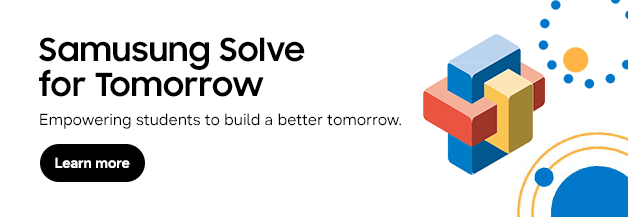300 State Finalists Shine in Samsung Solve for Tomorrow Competition, Nearing $100,000 Prize
12/5/2023

Today, Samsung Electronics America proudly announces the selection of 300 public middle and high schools from all 50 states across America as State Finalists in the esteemed 14th annual Samsung Solve for Tomorrow national STEM (Science, Technology, Engineering, and Mathematics) competition. Each State Finalist has secured a coveted $2,500 Samsung technology prize package, marking a significant milestone in their journey towards becoming one of three National Winners that each unlock $100,000 for their school. Overall, Samsung will award more than $2 million* in prizes to this year’s participating schools.
Samsung Solve for Tomorrow is a nationwide competition designed to empower students in grades 6–12 to leverage the power of STEM to create innovative solutions addressing critical issues in their local communities. The competition engages U.S. Gen Z students to catalyze change by applying Problem-based Learning (PBL) principles, environmental stewardship, and entrepreneurship to address some of society’s most pressing challenges. It also promotes active, hands-on learning, making STEM more tangible and showcasing its real-world applications.

Bloomington High School South
To view the full list of State Finalists, please visit Samsung.com/Solve. Notably, 50% of the State Finalists in the Samsung Solve for Tomorrow competition are Title 1 schools, underscoring the program’s commitment to inclusivity and equal opportunity. Reflecting Gen Z’s collective dedication to tackling pressing global challenges, 45% of the projects directly address issues related to the climate crisis, such as extreme weather like wildfires, hurricanes, and heat; microplastic pollution; air and water quality; the pollinator collapse; e-waste (electronic waste) risks; and light pollution. What’s more, this cohort of students are actively developing innovative solutions for a spectrum of other pressing societal issues, including accessibility, mental health matters like student anxiety and loneliness, food insecurity, cybersecurity, and aid for the unhoused and migrants.


